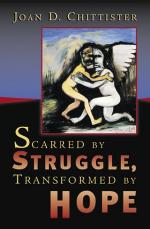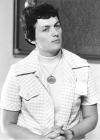Issue Date: May 23, 2003
Pain of not speaking out taught young nun a lifelong lesson Reviewed by KATHY COFFEY If you know someone who doesn’t struggle, save your money. Don’t waste their time. This is not the book for them. If, however, you or your friends cast your lot with the scrappy, grappling, hanging-on-by-the-skin-of-our-teeth rest of humanity, Benedictine Sr. Joan Chittister’s newest book is just the ticket. As I read, I mentally listed friends who would resonate with it because of their present life situations:
Chittister’s timing is exquisite. From recent events of church, state and personal experience emerges the burning need for a spirituality of struggle. We know by now that this author can be trusted not to camouflage prickly problems with “pious little nosegays.” Instead, she tackles the issues directly, with uncompromising, tough-minded practicality. No flummery here: Chittister issues a clean bugle call to the fray. Chittister begins with a question we all ask: How can some people come through crises strong and sure, while others shrivel and turn dour? Or as she puts it: “the spiritual question becomes how to go about each dying without giving in to the death of the soul.” Early on, she rejects the theory many heard as children: God is the great magician who saves us from reality and changes suffering to blessing. In short, it’s the familiar “dancing is bad, drinking is bad, hemorrhoids are good” theology. Only problem: The “if it hurts, it must be virtuous” approach is “a pitiful answer to the great losses of life and it never quite satisfies.” Instead, Chittister turns to the Judeo-Christian story of Jacob who wrestled with God and is wounded but victorious because of his struggle. She parallels it to her personal experience as a young nun, eagerly anticipating graduate work in creative writing at a prestigious university. An inexplicable phone call ended her dream: She was told to cook for a summer camp instead because it would help her humility.
To some extent all writing is autobiographical, but this book provides insightful glimpses into the person of Joan Chittister, the prophetic voice who empowers women and annoys hierarchs. This unintentional portrait shows the human being behind the controversies. Here we learn how it must hurt to be condemned; how something shrivels in the soul; how the heart cringes when an institution to which someone has given her life rejects her. We also learn the reason for her outspokenness. It all stems from one chance missed, the young nun who didn’t speak out about her own future. “I had failed my truest self once. … In the interest of obedience and nicety and approval, I had not said a single word.” She would not do it again. Avoiding that original “sin of silence” helped her endure phone calls in later years when she was disinvited, not welcome to speak the truth as she saw it nor raise the questions she thought pivotal. Readers who wonder about the wellsprings of her courage need only read between the lines. The Vatican may have finally met its match in a woman with steely inner authority. Initially, the crisis on which the book is built seems distant and relatively minor, especially in hindsight. Knowing that Chittister has written many fine books and is a sought-after speaker who inspires standing ovations, the reader wonders why it was such a big deal. Compared to the other struggles she mentions -- divorce, the death of a spouse or child, the end of a career, national catastrophes -- this shift in plans seems fairly mild. But as the book continues, we come to respect the crisis and what she draws from it. As she comments wisely, no scale weighs personal grief; one struggle cannot be more significant than another. So what will the reader gain from an intelligent investment of 20 bucks? Plenty. Here are some nuggets the book contains, many in the unmistakable trumpet tones of Chittisterian (destined to become an adjective like Churchillian) rhetoric: Insights on a God who is not a circus master, but a birthing mother who keeps on creating and asks the same of us. Trust that “it is the becoming that counts, not the achievements.” Knowledge that “enduring struggle is the price to be paid for becoming everything we are meant to be.” The surprising, hidden value of things that would not have been our first choices. “Detachment from the idea that there is only one way to go through life joyfully” or “the grace of discovering that our lives are more than any one event.” A vision of endurance as “the sacrament of commitment,” given not for paltry causes but “for the sake of the great things of life.” So I’ve blown the secret. Sue, Aaron, Rachel, Lynn and Co.: Now you know what book you’ll get from me for birthdays or Christmas. Welcome to the struggle that can characterize a lifetime. Blessings on a process that can bring out the best you are. Kathy Coffey’s newest book is Immersed in the Sacred: Discovering the Small Sacraments (Ave Maria). She lives in Denver, where she struggles with the transition to an empty nest after 30 years of parenting. National Catholic Reporter, May 23, 2003 |

